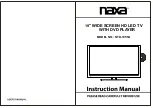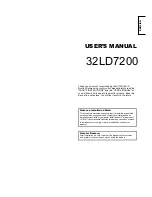
Precautions, Notes, and Abbreviation List
EN 7
QFU1.2E LA
3.
2014-Jan-10
back to
div. table
3.
Precautions, Notes, and Abbreviation List
Index of this chapter:
3.1 Safety Instructions
3.2 Warnings
3.3 Notes
3.4 Abbreviation List
3.1
Safety Instructions
Safety regulations require the following during a repair:
•
Connect the set to the Mains/AC Power via an isolation
transformer (> 800 VA).
•
Replace safety components, indicated by the symbol
h
,
only by components identical to the original ones. Any
other component substitution (other than original type) may
increase risk of fire or electrical shock hazard.
Safety regulations require that after a repair, the set must be
returned in its original condition. Pay in particular attention to
the following points:
•
Route the wire trees correctly and fix them with the
mounted cable clamps.
•
Check the insulation of the Mains/AC Power lead for
external damage.
•
Check the strain relief of the Mains/AC Power cord for
proper function.
•
Check the electrical DC resistance between the Mains/AC
Power plug and the secondary side (only for sets that have
a Mains/AC Power isolated power supply):
1.
Unplug the Mains/AC Power cord and connect a wire
between the two pins of the Mains/AC Power plug.
2.
Set the Mains/AC Power switch to the “on” position
(keep the Mains/AC Power cord unplugged!).
3.
Measure the resistance value between the pins of the
Mains/AC Power plug and the metal shielding of the
tuner or the aerial connection on the set. The reading
should be between 4.5 M
and 12 M
.
4.
Switch “off” the set, and remove the wire between the
two pins of the Mains/AC Power plug.
•
Check the cabinet for defects, to prevent touching of any
inner parts by the customer.
3.2
Warnings
•
All ICs and many other semiconductors are susceptible to
electrostatic discharges (ESD
w
). Careless handling
during repair can reduce life drastically. Make sure that,
during repair, you are connected with the same potential as
the mass of the set by a wristband with resistance. Keep
components and tools also at this same potential.
•
Be careful during measurements in the high voltage
section.
•
Never replace modules or other components while the unit
is switched “on”.
•
When you align the set, use plastic rather than metal tools.
This will prevent any short circuits and the danger of a
circuit becoming unstable.
3.3
Notes
3.3.1
General
•
Measure the voltages and waveforms with regard to the
chassis (= tuner) ground (
H
), or hot ground (
I
), depending
on the tested area of circuitry. The voltages and waveforms
shown in the diagrams are indicative. Measure them in the
Service Default Mode with a colour bar signal and stereo
sound (L: 3 kHz, R: 1 kHz unless stated otherwise) and
picture carrier at 475.25 MHz for PAL, or 61.25 MHz for
NTSC (channel 3).
•
Where necessary, measure the waveforms and voltages
with (
D
) and without (
E
) aerial signal. Measure the
voltages in the power supply section both in normal
operation (
G
) and in stand-by (
F
). These values are
indicated by means of the appropriate symbols.
3.3.2
Schematic Notes
•
All resistor values are in ohms, and the value multiplier is
often used to indicate the decimal point location (e.g. 2K2
indicates 2.2 k
).
•
Resistor values with no multiplier may be indicated with
either an “E” or an “R” (e.g. 220E or 220R indicates 220
).
•
All capacitor values are given in micro-farads (
10
-6
),
nano-farads (n
10
-9
), or pico-farads (p
10
-12
).
•
Capacitor values may also use the value multiplier as the
decimal point indication (e.g. 2p2 indicates 2.2 pF).
•
An “asterisk” (*) indicates component usage varies. Refer
to the diversity tables for the correct values.
•
The correct component values are listed on the Philips
Spare Parts Web Portal.
3.3.3
Spare Parts
For the latest spare part overview, consult your Philips Spare
Part web portal.
3.3.4
BGA (Ball Grid Array) ICs
Introduction
For more information on how to handle BGA devices, visit this
URL:
http://www.atyourservice-magazine.com
. Select
“Magazine”, then go to “Repair downloads”. Here you will find
Information on how to deal with BGA-ICs.
BGA Temperature Profiles
For BGA-ICs, you must use the correct temperature-profile.
Where applicable and available, this profile is added to the IC
Data Sheet information section in this manual.
3.3.5
Lead-free Soldering
Due to lead-free technology some rules have to be respected
by the workshop during a repair:
•
Use only lead-free soldering tin. If lead-free solder paste is
required, please contact the manufacturer of your soldering
equipment. In general, use of solder paste within
workshops should be avoided because paste is not easy to
store and to handle.
•
Use only adequate solder tools applicable for lead-free
soldering tin. The solder tool must be able:
–
To reach a solder-tip temperature of at least 400°C.
–
To stabilize the adjusted temperature at the solder-tip.
–
To exchange solder-tips for different applications.
•
Adjust your solder tool so that a temperature of around
360°C - 380°C is reached and stabilized at the solder joint.
Heating time of the solder-joint should not exceed ~ 4 sec.
Avoid temperatures above 400°C, otherwise wear-out of
tips will increase drastically and flux-fluid will be destroyed.
To avoid wear-out of tips, switch “off” unused equipment or
reduce heat.
•
Mix of lead-free soldering tin/parts with leaded soldering
tin/parts is possible but PHILIPS recommends strongly to
avoid mixed regimes. If this cannot be avoided, carefully
clear the solder-joint from old tin and re-solder with new tin.
3.3.6
Alternative BOM identification
It should be noted that on the European Service website,
“Alternative BOM” is referred to as “Design variant”.
The third digit in the serial number (example:
AG2B0335000001) indicates the number of the alternative
B.O.M. (Bill Of Materials) that has been used for producing the
specific TV set. In general, it is possible that the same TV
model on the market is produced with e.g. two different types
of displays, coming from two different suppliers. This will then
Содержание 42PFL6008S/12
Страница 13: ...Mechanical Instructions EN 13 QFU1 2E LA 4 Figure 4 5 Cable dressing 46 8000 series ...
Страница 15: ...Mechanical Instructions EN 15 QFU1 2E LA 4 Figure 4 9 Cable dressing 55 8000 series ...
Страница 48: ...IC Data Sheets EN 48 QFU1 2E LA 8 Personal Notes ...
Страница 49: ...Block Diagrams EN 49 QFU1 2E LA 9 2014 Jan 10 back to div table 9 Block Diagrams 9 1 Wiring Diagram Series 40 ...








































